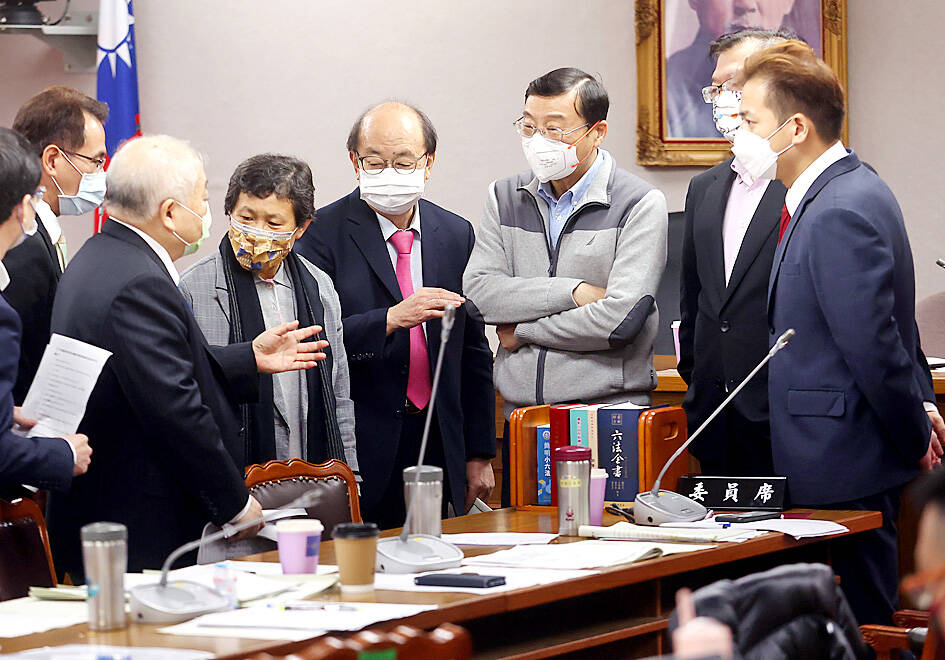The difference between the government’s GDP projection and the nation’s real economic performance accounts for a tax surplus from last year, finance officials told lawmakers yesterday.
The comments came after people questioned the legitimacy of tax surpluses from the past two years, as the government has said it would use part of a NT$450 billion (US$14.74 billion) tax surplus to distribute cash payments of NT$6,000 next month.
Directorate-General of Budget, Accounting and Statistics (DGBAS) Minister Chu Tzer-ming (朱澤民) said that the agency in August 2020 forecast GDP growth of 3.92 percent for 2021, but the real growth approached 6.5 percent, thanks to strong demand for electronic devices used in remote work and education.

Photo: CNA
Manufacturing sectors and individuals gained much higher incomes than expected, which inflated state coffers, Chu said.
DGBAS officials normally prepare fiscal budgets up to two years in advance based on data from recent years, and were therefore unable to account for the economic effects of the COVID-19 pandemic and the Russian invasion of Ukraine.
In 2021, securities and property transfers also outperformed government predictions by a wide margin and boosted related taxes, Chu said.
Major firms posted robust earnings in the first half of last year, but saw acute inventory corrections in the final quarter, as drastic interest rate hikes by global central banks hurt demand for goods and services, he said.
This resulted in another year of massive tax surpluses, helped by a quick recovery in private consumption after COVID-19 restrictions were relaxed and the nation reopened its borders, the DGBAS said.
When factoring in COVID-19 spending, the government incurred a small deficit last year, Chu said.
Acting Minister of Finance Frank Juan (阮清華) said the two-year time lag plays an important part in creating tax surpluses or shortfalls.
GDP growth over the past two years deviated from long-term averages, making budget projections difficult, Juan said.
Former minister of finance Su Jain-rong (蘇建榮) told a tax forum yesterday that it is not accurate to say tax surpluses are policy mistakes, as some officials have said.
Tax surpluses stem from the nation’s stronger-than-expected economic performance, said Su, who has resumed his position as a professor of finance at National Taipei University.
Su said he had reservations about the cash distribution plan, saying that the government should first seek to pay off its debt and enhance its financial resilience to avoid fiscal deficits or financial shocks.
The government has accumulated huge debts, which could become burdens on future generations, Su said.

GROWING OWINGS: While Luxembourg and China swapped the top three spots, the US continued to be the largest exposure for Taiwan for the 41st consecutive quarter The US remained the largest debtor nation to Taiwan’s banking sector for the 41st consecutive quarter at the end of September, after local banks’ exposure to the US market rose more than 2 percent from three months earlier, the central bank said. Exposure to the US increased to US$198.896 billion, up US$4.026 billion, or 2.07 percent, from US$194.87 billion in the previous quarter, data released by the central bank showed on Friday. Of the increase, about US$1.4 billion came from banks’ investments in securitized products and interbank loans in the US, while another US$2.6 billion stemmed from trust assets, including mutual funds,

AI TALENT: No financial details were released about the deal, in which top Groq executives, including its CEO, would join Nvidia to help advance the technology Nvidia Corp has agreed to a licensing deal with artificial intelligence (AI) start-up Groq, furthering its investments in companies connected to the AI boom and gaining the right to add a new type of technology to its products. The world’s largest publicly traded company has paid for the right to use Groq’s technology and is to integrate its chip design into future products. Some of the start-up’s executives are leaving to join Nvidia to help with that effort, the companies said. Groq would continue as an independent company with a new chief executive, it said on Wednesday in a post on its Web

JOINT EFFORTS: MediaTek would partner with Denso to develop custom chips to support the car-part specialist company’s driver-assist systems in an expanding market MediaTek Inc (聯發科), the world’s largest mobile phone chip designer, yesterday said it is working closely with Japan’s Denso Corp to build a custom automotive system-on-chip (SoC) solution tailored for advanced driver-assistance systems and cockpit systems, adding another customer to its new application-specific IC (ASIC) business. This effort merges Denso’s automotive-grade safety expertise and deep vehicle integration with MediaTek’s technologies cultivated through the development of Media- Tek’s Dimensity AX, leveraging efficient, high-performance SoCs and artificial intelligence (AI) capabilities to offer a scalable, production-ready platform for next-generation driver assistance, the company said in a statement yesterday. “Through this collaboration, we are bringing two

Even as the US is embarked on a bitter rivalry with China over the deployment of artificial intelligence (AI), Chinese technology is quietly making inroads into the US market. Despite considerable geopolitical tensions, Chinese open-source AI models are winning over a growing number of programmers and companies in the US. These are different from the closed generative AI models that have become household names — ChatGPT-maker OpenAI or Google’s Gemini — whose inner workings are fiercely protected. In contrast, “open” models offered by many Chinese rivals, from Alibaba (阿里巴巴) to DeepSeek (深度求索), allow programmers to customize parts of the software to suit their